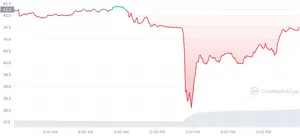The sudden sale of such a large number GMX tokens (which are comparatively illiquid compared to much larger cryptocurrencies like Ethereum) caused the price to suddenly drop from ~$41.50 to ~$38 per token, though the token price recovered fairly quickly. GMX is the native token for the defi exchange of the same name.
Hackers steal $3.2 million from GMX whale
- "Hackers steal $3.5M worth of digital assets from GMX whale", Cointelegraph
Users of several NFT marketplaces see porn, Big Bang Theory stills appearing instead of their NFT images
"What the fuck is happening, why my 5 years old kid watching porn JPEGs on [Magic Eden's] website" tweeted one shocked user.
The issue was resolved fairly quickly, although some visitors continued to see the unsavory images for a while longer due to browser caching.
Streamer and crypto founder DNP3 admits to gambling with investor funds
On January 3, he released a statement on Twitter explaining that he had become addicted to gambling over the past year — specifically mentioning his use of the Stake cryptocurrency casino. He wrote, "Every dollar I could find I would put into Stake in hopes of winning big. Even when the big wins did happen it wasn’t enough. Eventually I lost everything. In addition to my own life savings, I also irresponsibly used investor funds to try and 'get my money back' from the casino which was wrong for so many reasons."
The impact on the projects he created — and those who put money into them — is not yet fully clear.
Hacker drains the wallet of the RTFKT crypto project's COO
Gopalani tweeted that "I was hacked by a clever Phisher (same phone # as apple ID) & sold all my clone x / some other nfts... Obviously pretty upset and hurt by this and I havent really been able to move all day." He didn't provide further details, but a tweet by RTFKT CTO Samuel Cardillo suggested that Gopalani may have provided passwords or private keys to a phisher.
Gemini founder writes open letter to Barry Silbert begging for the return of $900 million
On January 2, Cameron Winklevoss — one of the twin brothers who operates Gemini — published an open letter on Twitter to Barry Silbert, the founder and CEO of DCG, which is the parent company of Genesis. DCG also has a substantial amount of money that they have borrowed from Genesis.
"More than 340,000 Earn users ... are looking for answers. These users aren't just numbers on a spreadsheet, they are real people. A single mom who lent her son's education money to you. A father who lent his son's bar mitzvah money to you. A husband and wife who lent their life savings to you. A school teacher who lent his children's college funds to you. A policeman, and so many more. All together, these people entrusted more than $900 million of their assets to you," wrote Winklevoss, without any apparent self-reflection on the fact that these words could just as easily have been (and should also be) addressed to him by those same customers of his service.
Bitcoin core developer claims his wallets were compromised, more than 216 BTC (~$3.6 million) stolen
Dashjr complained on Twitter about having trouble getting in contact with the FBI about the theft. Some joked about the irony of a Bitcoin maximalist running to the FBI when his coins were stolen.
There are some questions about the veracity of Dashjr's claims, given his supposed security practices, the extent of the breach, and some of his odd comments on Twitter.
Swiss crypto broker Covario goes bust
The firm had attempted to keep up appearances that all was well, spending lavishly and even opening new offices several weeks before entering bankruptcy. However, it turns out that employee pension contributions had not been being paid since early summer. Employee salaries had not been paid since October.
- "Pleite von Zuger Krypto-Startup: PK, AHV, Löhne offen", Inside Paradeplatz (in German)
Tax loss harvesting service emerges to help collectors unload their worthless NFTs
"This tool really helped me unload those embarrassing early NFT Hype investments. Should shave about $1000 off my tax bill", a supposed user writes in a testimonial blurb on the site (although the testimonials appear to be faked).
Perhaps someone has finally found a viable crypto business model after all.
Wallets linked to Sam Bankman-Fried's Alameda Research unexpectedly begin selling off $1.7 million in tokens
Altogether, an estimated $1.7 million was moved through various services to obfuscate the flow of funds.
3Commas finally owns up to API key leak
3Commas did not come off looking very good after this incident, after they spent weeks denying any breach and accusing those who were concerned 3Commas had been compromised of spreading misinformation and "FUD".
Researcher zachxbt wrote that he had verified 44 victims who had lost a combined $14.8 million due to the leak, although he acknowledged that this was only the number of people he could verify and that the total number of people affected was likely much higher.








